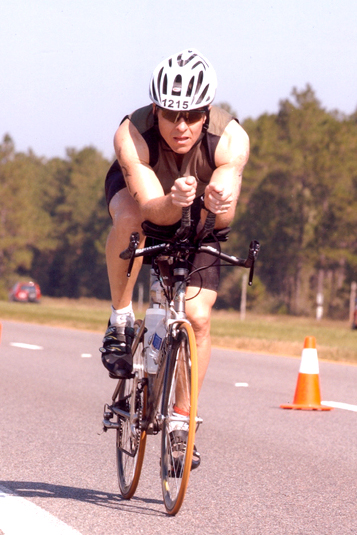
| NEWS |
| |
| FEATURES |
| ENTERTAINMENT |
| COLUMNS |
| CONTACT US |
| HOW TO SUBMIT |
| BACK ISSUES |
 caption:
|
Juggling Training With Princeton Medical Practice, Barton Heading to World Ironman Championship
By Bill Alden
Hitting the road at 4 a.m. for a two-hour bike ride is a daunting prospect for most people.
But for Dr. William Barton, his daily pre-dawn bike journey down Princeton Pike into Lawrenceville is a highlight of his day.
"My morning workout is like a little vacation," said Dr. Barton, a pulmonologist with the Princeton Medical Group and a marathon runner turned triathlete. "I love it."
Barton's daily bike holiday, though, is just the beginning of his exercise regimen as he customarily logs 35-40 miles a week running and puts in weekly swimming workouts totaling 12,000-15,000 yards.
Over the next month or so, Barton¹s workouts will have a special urgency as he readies himself to compete in the seminal event in his sport, the Ironman Triathlon World Championship which takes place on October 15 in Kailua-Kona, Hawaii.
The world famous event, which consists of a 2.4 mile swim, a 112-bike ride, and a 26.2 mile run, represents a special step in Barton's triathlon career, which began in 2000 when he turned to cross-training due to a persistent knee problem caused by running.
Barton, 42, who has run in three Boston Marathons, took to the triathlon immediately. "I did my first triathlon in Lancaster, Pa." said Barton, noting that he started at the Olympic distance of a 0.9 mile swim, a 24.9 mile bike, and a 6.2 mile run.
"It was much more fun than road racing. Doing the first one is big. Psychologically, the swimming is tough. It was my first swim with 100 crazed athletes kicking me. I progressively went to the longer distances; I found that I liked the longer stuff."
Barton, who qualified for the world championship event by placing 70th in a time of 10:25 at the Ironman Lake Placid in late July, relished the challenges of his grueling sport.
"The distance in and of itself is very difficult, even for the most fit athletes in the world," explained Barton, who typically works 60 hours a week in his medical practice. "You can always blow up physically. At Lake Placid, two of the top women triathletes had to walk the whole marathon."
Barton, for his part, was floating on air after the Lake Placid event as it became the platform for him to realize his long-held dream to qualify for Hawaii. "The Ironman in Hawaii is something that has been in the back of my mind," said Barton, who plans to head out to Hawaii a week before the race to acclimate himself to the course. "I was ecstatic to qualify. I'm still on Cloud 9."
A major factor that drives Barton in his training is the camaraderie he feels with his fellow triathletes. "It's you against the course rather than against the other athletes," explained Barton, who will be tuning up for the Hawaii event by competing in the Delaware Diamond Man Half Ironman next week.
"The people are so supportive. There is a real spirit of helping each other out. At Lake Placid, I was cramping in the marathon run and my shoe came untied and I couldn't bend down to tie it. A women runner passed me by and told me my shoe was untied. When I told her I couldn't tie it, she stopped and tied it for me. I like to get to races a few days early and hang out with the other athletes."
Barton is planning to keep hanging out with his triathlon buddies for a while. "It's great to see people in the 50s and 60s competing in triathlons," said Barton, who credits his wife, Alana, with providing him the support that makes it possible for him to both train and travel to races. "I'm taking it one day at a time. I want to do triathlons as long as I can."
